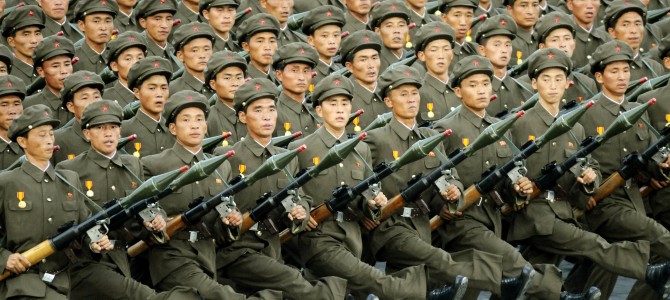
PBS’s Frontline recently aired a shocking new documentary on the “Secret State of North Korea.” The documentary’s most chilling scenes, filmed inside the hermit kingdom by North Koreans, required those filmmakers to risk not only their lives, but the lives of their entire families. Many of the scenes have been shown before, and most of the subjects interviewed have been interviewed by other journalists in the past. The horror stories told are familiar to anyone who has followed the regime’s atrocities over the last several decades. What made the documentary so shocking was the fact that this footage, filmed as recently as last year, was aired quietly on PBS, not as an expose featured prominently on cable or the nightly news.
Interviews conducted with North Korean citizens paint a horrifying picture of life for North Koreans of every stripe: orphans, members of the ruling class, defectors, and political prisoners. The lives of the supposedly privileged elite will ring familiar: an inner circle that looks appealing and esteemed from the outside, but in which status, wealth, power, influence, and the other trappings of authoritarian power structures are tensely transitory. While the ruling class has access to food and premium living conditions, they are also at risk of purges–as we recently saw with the public execution of Kim Jong-un’s uncle Jang Song-Thaek. A former senior propagandist, Jang Jin-Sun, defected to South Korea and told the documentary’s producers, “In North Korea they promote the leader to be the sun. If you go too close you burn, if you go too far you freeze to death.” It isn’t clear if there’s anything in between.
The ruling class may have access to goods out of reach of the average North Korean, but luxury options are few even for those who are relatively far better off. The documentary exposes how department stores, showcased by the regime, are filled with goods on display, not for sale. And it is estimated that one in one hundred North Koreans is a political prisoner. Gulags the size of Los Angeles have been spotted on Google Earth and Google Maps. A survivor of one of the camps escaped–a rare feat–and penned the harrowing best-selling memoir Escape from Camp 14.
A Japanese journalist, Jiro Ishimaru, coordinates North Korean filmers, spiriting their footage out of the country. “Obviously, it’s an extremely dangerous thing to do,” he says. “In North Korea, even filming everyday life is considered an act of political treason. If they’re caught filming, they would be locked out and may never be let out again…” The documentary’s narrator explains “These are the pictures that Kim Jong-un doesn’t want the world to see.” One of the North Korean filmmakers is a state employee and has been taking video inside the country for the last five years. During a cloaked on-camera interview he stated, “This is dangerous, and if I get caught I know I would immediately be executed as a traitor to the Korean people. But I have got to do this. I have got to do this no matter what. I am just one person. Even if I have to sacrifice my life, someday something is going to change.”
The title of the project, the “Secret State of North Korea,” is an accurate descriptor of the documentary’s contents. It’s not thanks to the Kim family that the North Korean regime’s atrocities largely remain a secret to the outside world. For as long as there have been defectors, the world has known about purges, famines, gulags, and more. Why are North Koreans risking their lives to get this footage public? Defectors from the regime, living in South Korea, have been targeted by the North Korean government for kidnapping and execution.
Despite this risk, why are these individuals risking their lives to publicize the plight of their countrymen after their successful escape? It’s not just the West that is indifferent to the fate of North Korea; their own neighbors to the South are indifferent at best and hostile at worst to North Korean defectors and the prospect of unification. Quite simply, the “Secret State of North Korea” remains a secret, even after this documentary, because the outside world wills it to be. We cannot threaten the Assad regime over its use of chemical weapons or declare “Never Again” every year on Holocaust Remembrance Day if we let it be known that babies are still being born into concentration camps in the year 2014. Their stories deserve to be told, but they fall on deliberately deaf ears.
Follow Bethany Mandel on Twitter.









